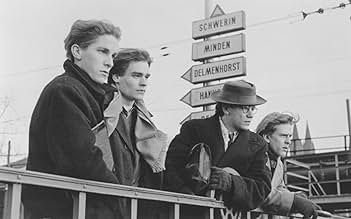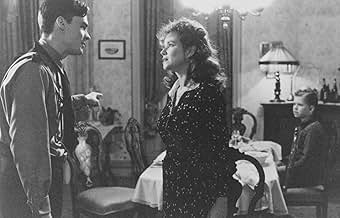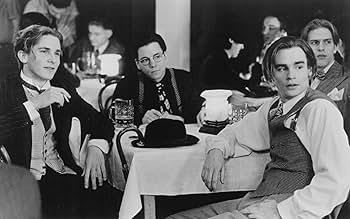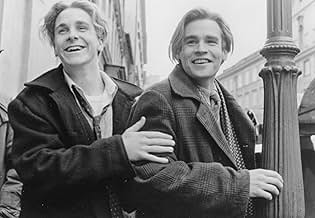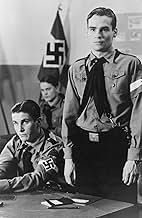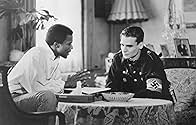Juste avant le début de la Seconde Guerre mondiale, de jeunes allemands revendiquent leur engouement pour de la musique interdite par les nazis.Juste avant le début de la Seconde Guerre mondiale, de jeunes allemands revendiquent leur engouement pour de la musique interdite par les nazis.Juste avant le début de la Seconde Guerre mondiale, de jeunes allemands revendiquent leur engouement pour de la musique interdite par les nazis.
- Réalisation
- Scénario
- Casting principal
- Récompenses
- 1 victoire et 1 nomination au total
- Helga
- (as Jessica Stevenson)
Avis à la une
This film is looking at how some German youths avoided the Hitler Youth and the nazi regime insofar as they could, and what they spent their time doing (dancing, listening to swing music and being with their friends).It does show some useful aspects about how the Hitler Youth were expected to behave and the propaganda they were exposed to, as well as about swing youth and their attitude to the regime.It is an entertaining and poignant film which explores friendship,romance and growing up against the backdrop of one of the most vilified periods in modern history
Basically Swing Kids does what it does well. Maybe it isn't a Schindler's List, but it does have its merits.Watch it and you'll find them!
BTW - could I just point out, many people on here have referred to the Holocaust, as though it is interchangeable with the Nazi regime, and have used the phrase in their reviews. Just to clear up this: the holocaust specifically refers to the gassing of Jews at extermination camps from 1942 onwards, essentially the Final Solution. As this film is set in 1939 it is prior to this.
Had "Swing Kids" been released some time after Steven Spielberg's epic "Schindler's List", critics may not have been quick to bring up that point. However, "Cabaret" (1972) was also about Berlin counterculture amidst the rise of the Nazi party, and no one seemed to have a problem with that film.
"Swing Kids" is by no means a perfect film, but it also shouldn't be dismissed specifically because it doesn't take place in a concentration camp, and no one can be seen being tortured or killed. It's a small footnote, but by no means an uninteresting story.
The movie centers around Peter Muller (Robert Sean Leonard, who I couldn't help but think bore a striking resemblance to Jim Carrey in this movie), a German student barely out of his teens who, along with his friends Thomas (Christian Bale) and Arvid (Frank Whaley), love to stay out late and dance to big band swing music. They wear their hair long, own zoot suits, and are rebellious against the Nazis at first for rebellion's sake. They don't seem to be phased by the Nazi's propaganda against the Jews and other ethnicities until later in the film, although that point is not clarified well in the beginning.
Peter reluctantly joins the Nazis when his mother's significant other, Herr Major Knopp (Kenneth Branagh), pulls some strings after Peter's arrest involving a stolen radio. His other option is to be sent to jail, or perhaps even a concentration camp. Thomas enlists as well just to join Peter, but they ultimately don't give up their night life of Benny Goodman and Glenn Miller. However, the more Peter learns about the Nazis, the more he hates them. Thomas, on the other hand, falls into the Nazi propaganda over time.
The overall story is told pretty well here. Robert Sean Leonard is good as the moral compass of the story. Nowadays, I'm used to seeing Christian Bale in either villainous roles ("American Psycho" (2000), "The Prestige" (2006)), or as heroes with a noticeable dark side ("The Dark Knight" (2008), "Terminator: Salvation" (2009)). However, here Bale plays a guy who is a genuinely good friend at first, and his good acting made me forget about his later roles. At the same time, when his character becomes entrenched in the Nazi life, Bale somehow made this dramatic transition smoothly without seeming contrived.
Frank Whaley is also effective as the crippled friend Arvid, who can't join the Nazi army even if he wanted to because of his condition. Arvid plays jazz guitar, and knows a lot about American jazz. He is frequently bullied and beaten by Nazi soldiers his age, but still has energy to rebel. Whereas Leonard is the moral compass here, Whaley is the heart. I can't give away what happens to Arvid in this movie, but you really do feel for him as the movie progresses.
"Swing Kids" has a very good story, and characters good and bad that you really care about. Among the major weaknesses in this movie is the fact that it takes place entirely in Germany, yet none of the characters actually speak German. Normally that fact would not be a problem, but my issue was that the good guys here spoke with either American or British accents, whereas the villains (such as Branaugh) spoke with a heavy German accent. It's as if Hollywood hasn't gotten over the idea that German or Russian accents sound evil, even long after World War II and the Cold War ended. In this story, it goes without saying that accents shouldn't matter.
This is why I think the movie would have worked better as a foreign film made by Germans, rather than an American film made by the Disney company. If everyone was speaking German, allegedly evil accents wouldn't be an issue. On the other hand, "Cabaret" had good guys in it that had German accents. Why couldn't this film?
Also, perhaps I'm asking too much here, but the written epilogue at the end wasn't enough for me. Of course, as I mentioned earlier, not every film that takes place during World War II has to be dark and depressing, but it would have been nice to have received a glimpse of what these swing kids went through in concentration camps, how they coped, and whether they got out alive or not. Maybe such a broad subject could still be the basis for another movie, but just two written sentences before the credits broke the Golden Rule of Storytelling: Show, Don't Tell.
This film would have benefited from being shelved for at least a year, and perhaps being released a little while after "Schindler's List" made its run. Compared to concentration camps, young men in Germany who loved American music seems insignificant in comparison, but by no means does it discredit the alternative history lesson from being told. Critics could have been more open-minded to the movie, but the good thing is that the film now has a cult following. It still nags me that the film wasn't in German, though. At least it has historical accuracy on its side.
There were some not-so-great things about the movie, like some characters or scenes which, when you think back, seem to have been included for an unknown reason. But the good points of the movie out-weigh the minor nit-picks. The swing music and dancing in the movie was awesome, and I thought all the characters were acted very well by the actors. They did a good job of showing the confusion that the young Germans must have felt, not knowing who was right. All in all, I really enjoyed this movie, and I think it makes you think as well.
The value of the movie is precisely that it is trivial. There is no hindsight. The audience, like the characters, is caught up in the everydayness of everyday life in a totalitarian state. The Nazis are the government, and as far as anyone can see in 1938-39 they are going to go on being the government forever. The war hasn't happened yet. The Swastika flag flying over every post office and courthouse doesn't give them a little shudder of horror; it's as normal as the Stars and Stripes is to us. All sensible, respectable people who aren't Nazis themselves go along with the Nazis, because they have no reason not to.
Auschwitz hasn't happened yet either. Sure, there are concentration camps out there somewhere, but that has nothing to do with normal, ordinary people who behave themselves. Unless you happen to know a Jew or a political dissident yourself, what the government is doing to people like that isn't your problem.
The teen-aged lead characters find themselves in opposition and in trouble, not because they have any principled objections to the government, but simply because they find respectable culture boring and want to amuse themselves. The first reaction of authority, in the person of Kenneth Branagh's kindly Gestapo man, is that all they need is a good talking to, a second chance, and a little constructive guidance in the Hitler Youth and they'll grow up to be good citizens. He's fifty percent right; Thomas does respond positively to the comradeship and healthy outdoor activity he finds there.
The ultimate choices made by the two boys are governed not by principle but by their personal situations. Thomas has been rebelling against his cold, pompous, wealthy father, whom he loathes, and he ultimately decides that being a dutiful Nazi and denouncing the old man to the Gestapo offers him much better revenge than dancing to illegal jazz records. Peter recoils from the Hitler Youth (and from his former friend) because his own father had disappeared, perhaps into the camps, after the Nazis took power several years earlier.
There's's no hindsight in the movie's perspective, and no heroism. Instead, it gives us ordinary, everyday people dealing with ordinary everyday life as they find it, from the viewpoint of a high school student. The movie leads the adolescents who are its target audience to ask themselves an unpleasant question -- would they be any different, any more politically aware, if they were in the same situation? Indeed, would they even realize it if they were actually in the same situation now?
The implicit answer is that they probably wouldn't be all that different from ordinary non-political German teenagers in 1938, minding their own business, going about their own lives, and at most trying to carve a little more personal space than the government wants to give them. That's disconcerting and not at all flattering, which is why Swing Kids is worth watching.
Le saviez-vous
- AnecdotesDespite the fact that Kenneth Branagh plays a major role in this movie, he is uncredited. Reportedly, Branagh refused to be credited out of concern that he would be billed above Robert Sean Leonard, Christian Bale, and the other boys, whom Branagh proclaimed were the real stars of the film.
- GaffesAt the end of the film, when Willy is running after Peter and stops, there is clearly nothing at Willy's feet. Later, after being told "Swing Heil", he grabs an umbrella on a wet poster at his feet that clearly wasn't there before.
- Citations
Arvid: I would rather belong to any one... ANYONE, than belong to the Nazis like you do.
Thomas Berger: That's because you have everything backwards. Nazis go anywhere they want, do anything they want, everyone gets out of our way.
Arvid: Quiz time. Got your glasses on.
Thomas Berger: What?
Arvid: It means you don't know who your friends are.
- Bandes originalesLife Goes to a Party
Written by Harry James and Benny Goodman
Meilleurs choix
- How long is Swing Kids?Alimenté par Alexa
Détails
Box-office
- Budget
- 12 000 000 $US (estimé)
- Montant brut aux États-Unis et au Canada
- 5 632 086 $US
- Week-end de sortie aux États-Unis et au Canada
- 1 967 957 $US
- 7 mars 1993
- Montant brut mondial
- 5 632 086 $US
- Durée
- 1h 52min(112 min)
- Couleur
- Mixage
- Rapport de forme
- 1.85 : 1


